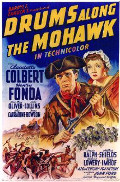
Directed by
John Ford
103 minutes
Rated PG
Reviewed by
Bernard Hemingway

Drums Along The Mohawk
Although Stagecoach, also released in 1939, is justly regarded as John Ford’s first major stylistic contribution to the Western genre Drums Along The Mohawk an adventure yarn set in the Mohawk Valley during the American Revolution has all the elements of the director’s approach; a story of brave and steadfast men taming the wilderness with their stalwart women by their side, a mixture of action, sentimentality and comic relief, not to mention Henry Fonda in the lead and Ward Bond as a goodhearted buffoon. The result is a solid enough showing albeit one that is somewhat dated and wears thin in its latter stages due to a lack of dramatic substance.
The subject matter is one that, surprisingly, is rarely treated in American film – the uprising of the American colonies against British rule. Fonda plays Gilbert Martin, a New Yorker who takes his brand new bride (Claudette Colbert) into the rural part of the state to start a life as a farmer. The British and their Tory supporters have enlisted the help of the Indians to turn the homesteaders off their land and when the Martin’s home and crops are burnt to the ground they take a job at the farm of a Mrs. Mc Klennar (Edna May Oliver) as the war of Independence rages on.
Ford shows a commendable effort to present a historically convincing account of the lives of the settlers who were mostly of German stock and who did whatever it took to survive four years of British and Tory pillaging and Indian raids with, as is pointed out in the closing scene, no real sense of nation-building.
Edna May Oliver’s fiercely independent, sharp-tongued Widow McKlennar and Arthur Shields’ spruiking parson are two amusing characters amongst Ford’s usual roster of rough diamonds and in a small role John Carradine is effective as the nefarious Tory captain, Caldwell. Fonda is, as always, Fonda whilst Colbert, who is variously hysterical, fainting and rifle-wielding lends an oddly melodramatic if photogenic presence to proceedings,
Drums Along The Mohawk was in its day considered as quality entertainment (Oliver received an Oscar nomination for Best Supporting Actress but lost to Hattie McDaniels in Gone With The Wind, whilst cinematographers Bert Glennon and Ray Rennahan received Academy Award nominations for their fine Technicolor work but the award went to Rennahan with Ernest Hailer, once again for GWTW). Those days have long gone but the film is still serviceable, and for Ford fans, no doubt even more than that.
Want something different?





